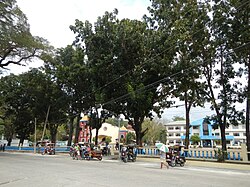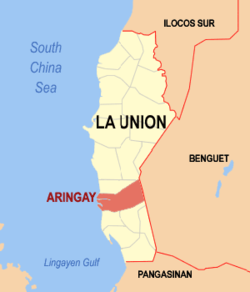Aringay, La Union
| Aringay | |||
|---|---|---|---|
| Municipality | |||

Aringay town center along the National Highway
|
|||
|
|||
 Location in the province of La Union |
|||
| Location within the Philippines | |||
| Coordinates: 16°23′00″N 120°24′55″E / 16.38333°N 120.41528°ECoordinates: 16°23′00″N 120°24′55″E / 16.38333°N 120.41528°E | |||
| Country | Philippines | ||
| Region | Ilocos Region (Region I) | ||
| Province | La Union | ||
| District | 2nd District | ||
| Founded | 1641 | ||
| Barangays | 24 | ||
| Government | |||
| • Mayor | Eric O. Sibuma | ||
| Area | |||
| • Total | 84.54 km2 (32.64 sq mi) | ||
| Population (2015 census) | |||
| • Total | 47,458 | ||
| • Density | 560/km2 (1,500/sq mi) | ||
| Time zone | PST (UTC+8) | ||
| ZIP code | 2503 | ||
| Dialing code | 072 | ||
| Income class | 2nd class | ||
Aringay (Ilocano: Ili ti Aringay) is a second class municipality in the province of La Union, Philippines. According to the 2015 census, it has a population of 47,458 people.
Its boundaries are formed by the municipalities of Caba and Burgos to the north, Agoo to the south, the foothills of the Cordillera Central mountain range to the east, and the Lingayen Gulf to the west. Aringay belongs to District 2 in the province.
The town experiences the prevailing monsoon climate of Northern Luzon, characterized by a dry season from November to April and a wet season from May to October. Its economy is based primarily on agriculture, producing rice, tobacco and fruit crops as economic staples. A nascent tourism industry is centered on its beach resorts. Its ethnic population is predominantly Ilocano and Christian (Roman Catholic).
Aringay was an ancient village known in pre-colonial times as Alingay or Alinguey. When Spanish colonizers arrived in the late 16th century, they found an enclave of ethnic Pangasinenses actively trading with their Ilocano and Ifugao neighbors and traders from China, Japan and Southeast Asia. The presence of Spanish soldiers, administrators and Augustinian missionaries ushered in the town’s colonial era and its conversion to Roman Catholicism.
...
Wikipedia



